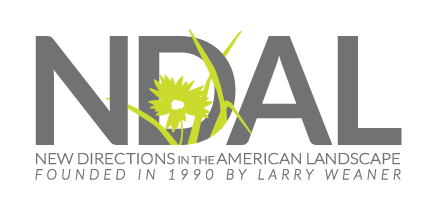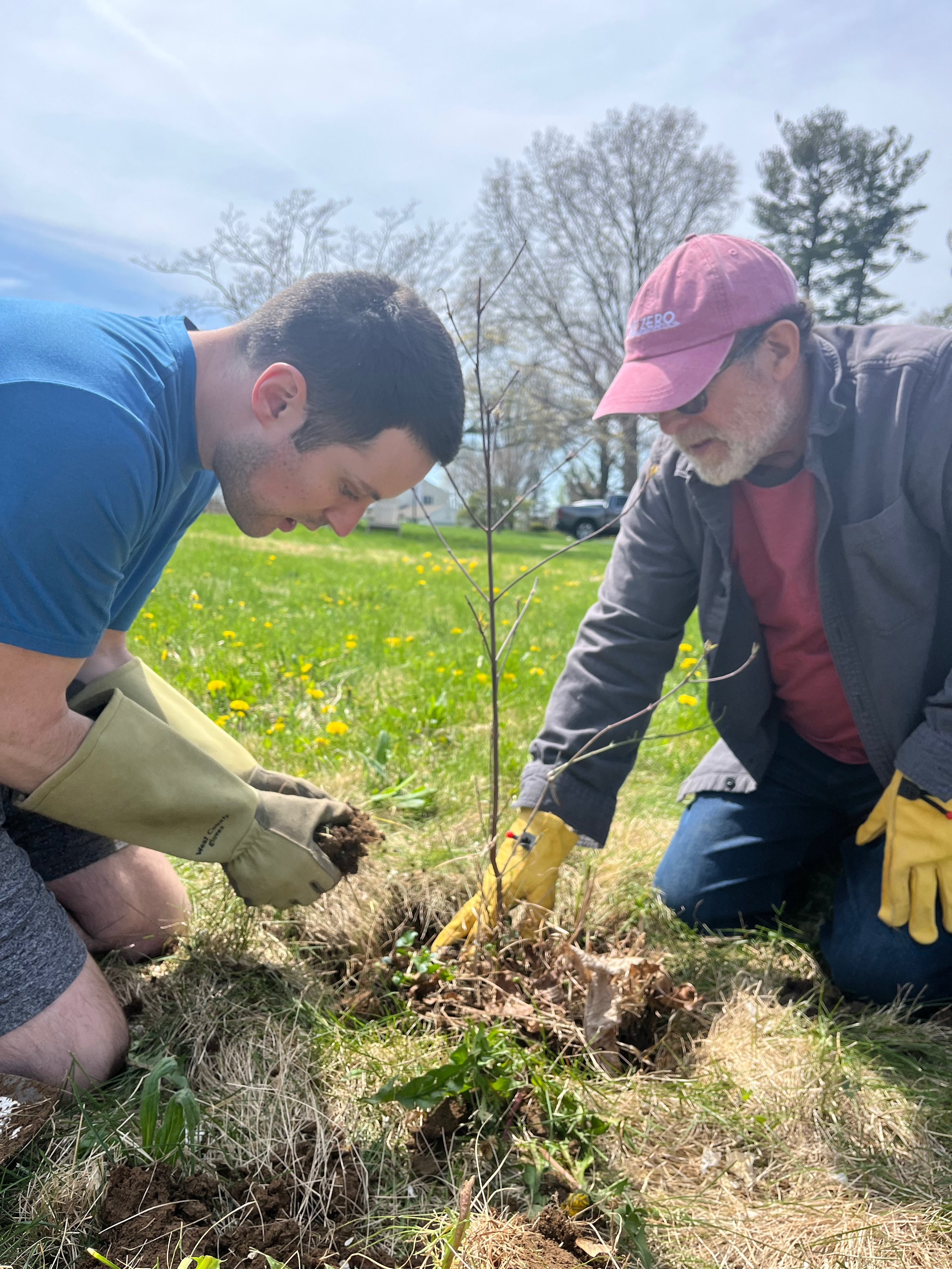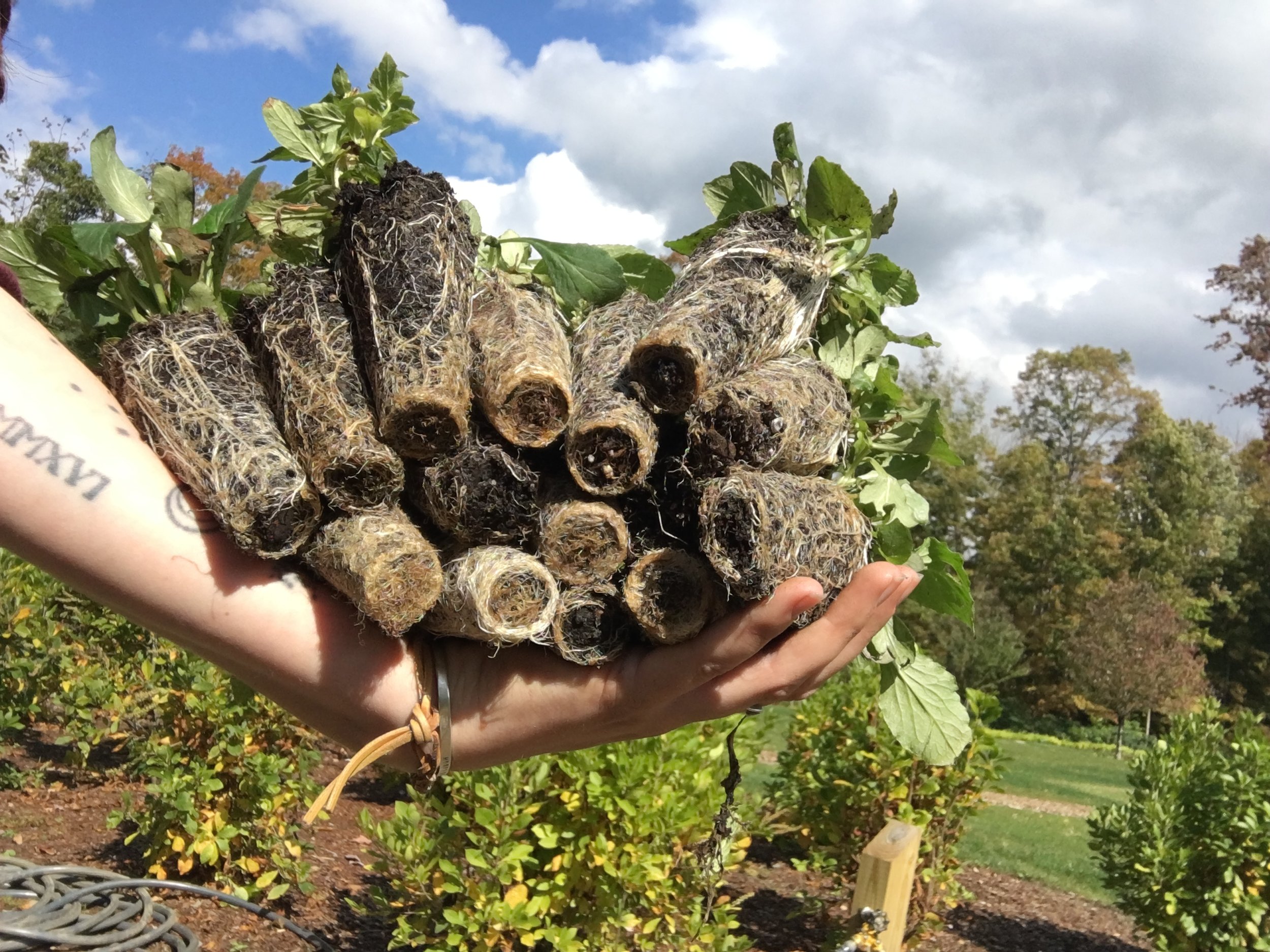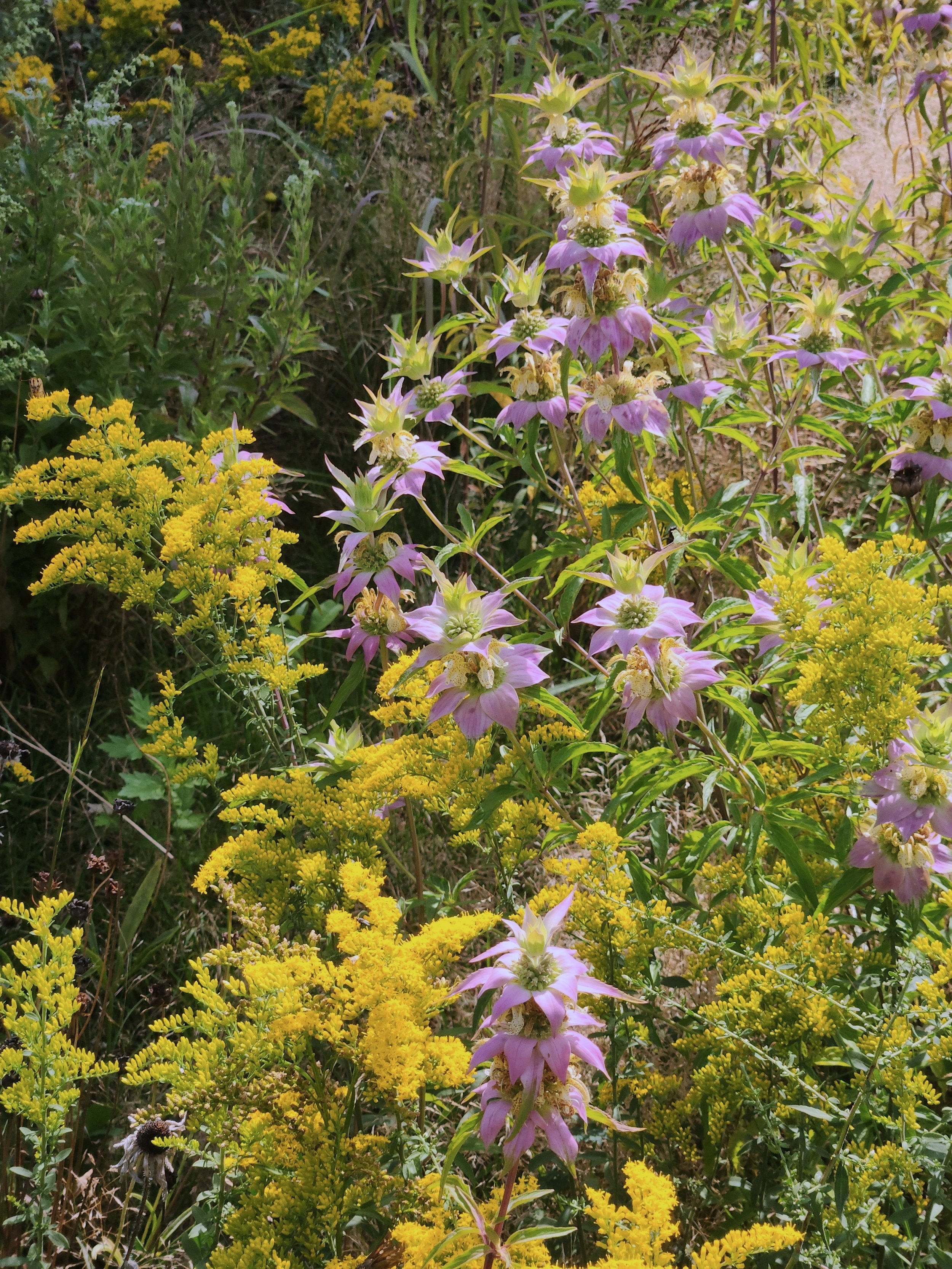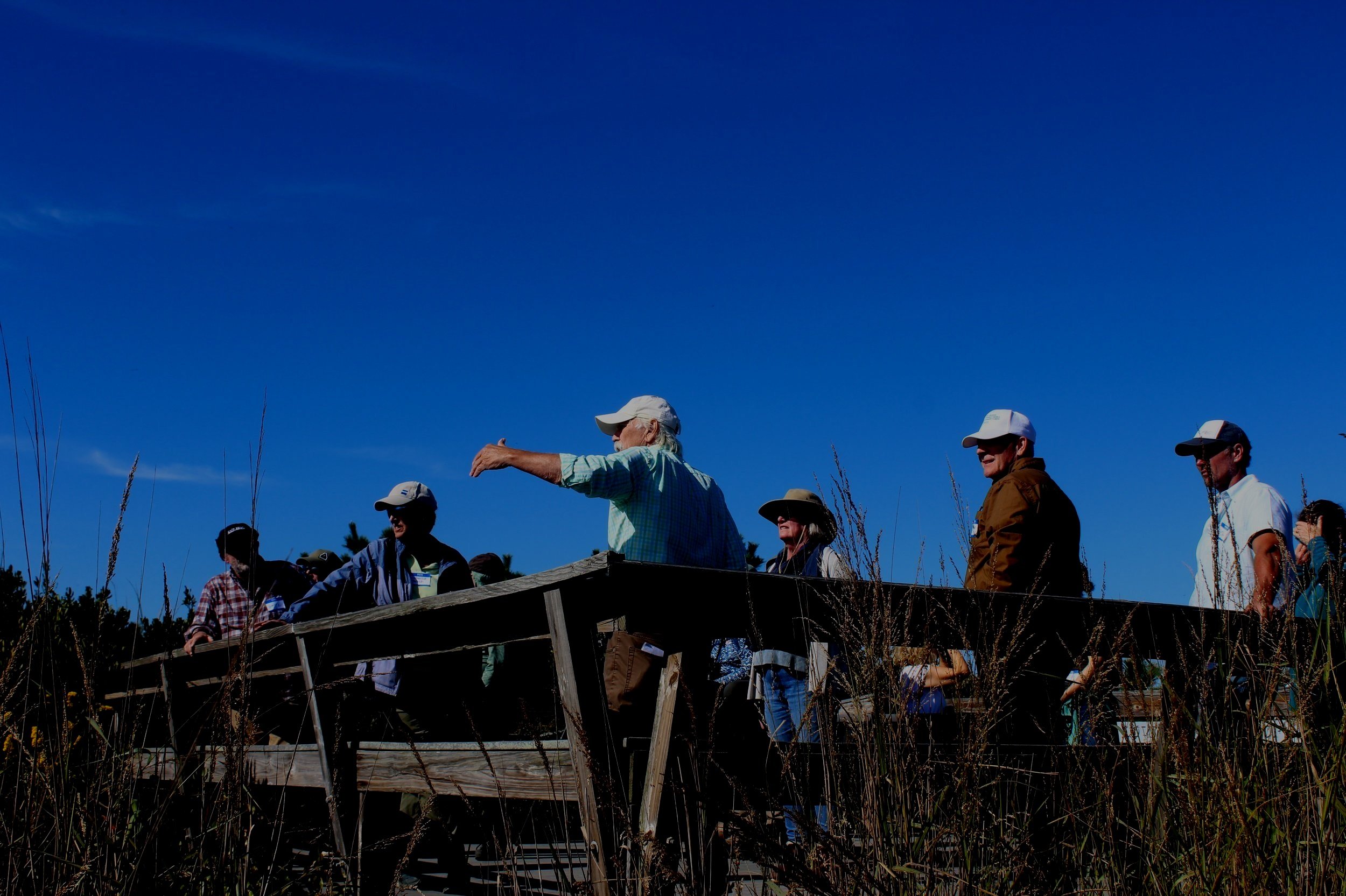
All Scheduled Programs
What’s on the horizon:
Ecology-based Landscape Practice
A 7-part Virtual Intensive Course for Professionals
Live July - August, 2025
Individual Sessions:
Landscaping with Nature:
Turning Battles into Partnerships
A 4-part Virtual Intensive Course for Home Gardeners
Live September - October 2025
Individual Sessions:
Meadow Making:
A Brains Over Brawn Approach
A 4-part Virtual Intensive Course for Home Gardeners
Live September - October 2025
Individual Sessions:
NDAL In the Field:
Upcoming In-Person Program for Professionals
2025 Spring Virtual Education Series
Individual Professional & Home Gardener Sessions
Newly Added! Lawn to Meadow & Native Perennials
Previously Held:
(Recordings available for 3 months from live date)
Free Q&As!
Garden Chats with Larry
Get your questions answered by Landscape Designer Larry Weaner. Ask anything related to ecology-based gardening and landscape practice.
Where: Instagram Live
When:
Friday, August 8th, 2025
Friday, November 7th, 2025
6:00 - 6:30 PM ET
Meadow Making:
A Brains Over Brawn Approach
A 4-part Virtual Intensive Course for Home Gardeners
RECORDINGS
Previously Held:
(Recordings available for 3 months from live date)
Landscaping with Nature:
Turning Battles into Partnerships
A 4-part Virtual Intensive Course for Home Gardeners
RECORDINGS
Previously Held:
(Recordings available for 3 months from live date)
Ecology-based Landscape Practice
A 7-part Virtual Intensive Course for Professionals
RECORDINGS
Individual Sessions:
(registration open and recordings viewable for 3 months)

Intensive Course Session 1 of 7 | Foundational Ecological Principles (Summer 2025)
Professional Virtual Intensive Course
Instructor: Larry Weaner, FAPLD
*Sessions 1 & 2 recommended prerequisite for all other Sessions
Our opening presentation will examine the species traits, vegetative patterns, and ecological processes found in spontaneous plant communities. The patterns and processes explored will include disturbance, succession, competition, and relative ecological stability. This session will serve as the theoretical basis for the practical design, planting, and management procedures detailed in all subsequent sessions.
Registration is open and the recording is viewable for 3 months after the live session date.

Intensive Course Session 2 of 7 | Ecology-based Design (Summer 2025)
Professional Virtual Intensive Course
Instructor: Larry Weaner, FAPLD
*Sessions 1 & 2 recommended prerequisite for all other Sessions
Larry will expand upon the ecological principles described in Session 1 by illustrating them in the context of landscape plans, planting protocols, and management procedures. He will also describe often-neglected plant characteristics that are crucial to ecology-based practice. These will include habitat fidelity, colonization patterns, seasonal growth period, life spans, spatial and temporal niche, and proliferation strategies.
Registration is open and the recording is viewable for 3 months after the live session date.

Intensive Course Session 3 of 7 | The Open Landscape: Meadows, Old Fields, & Shrublands (Summer 2025)
Professional Virtual Intensive Course
Instructor: Larry Weaner, FAPLD
Wildflower meadows and native grasslands are in high demand, but effective protocols for successfully achieving them are in short supply. Here we will delve into the nitty gritty of meadow design: site analysis, species selection, seed mix formulation, live plant inclusion, planting and management. The inclusion of shrub thickets and drifts will also be covered, including the arrangement of clonal vs. clump forming species, and the use of shrublands as ecological and visual “connective tissue” between meadow and woods.
Registration is open and the recording is viewable for 3 months after the live session date.

Intensive Course Session 4 of 7 | Plants of the Open Landscape: Meadows, Old Fields, & Shrublands (Summer 2025)
Professional Virtual Intensive Course
Instructor: Ian Caton
In this session, native plant authority Ian Caton will examine plants of the open landscape that exemplify the ecological characteristics described by Larry Weaner in previous sessions. His presentation will span the successional period from herbaceous meadow, to mixed woody/ herbaceous old field, to the ecologically important but often neglected clonal shrub thicket. He will also present a group of “workhorse” native species for the sunlit landscape that combine reliability and weed suppression with attractive aesthetic character.
Registration is open and the recording is viewable for 3 months after the live session date.

Intensive Course Session 5 of 7 | The Canopied Landscape: Woodlands, Edges, & Hedgerows (Summer 2025)
Professional Virtual Intensive Course
Instructor: Larry Weaner, FAPLD
An ecology-based approach to woodland design is more like guiding a vegetative process than implementing a static planting plan. Guided succession can foster the orderly transformation from an open field to a multi-tiered forest through planting, managed natural recruitment, or a combination of the two. Under existing canopy, where few herbaceous species can be established through direct seeding, we will discuss the planting of small “seed source colonies,” and management strategies to encourage their proliferation into the larger landscape. Management techniques that are unique to woodlands including selective height cutting, sunlight manipulation, and assisted seed dispersal, will also be described in detail.
Registration is open and the recording is viewable for 3 months after the live session date.

Garden Chat with Larry | Free, Live Q&A (Summer)
Join us for our Live Q&A Series with Larry Weaner! "Garden Chats with Larry" will be a FREE Instagram Live series with our very own Larry Weaner.
FREE AND OPEN TO ALL
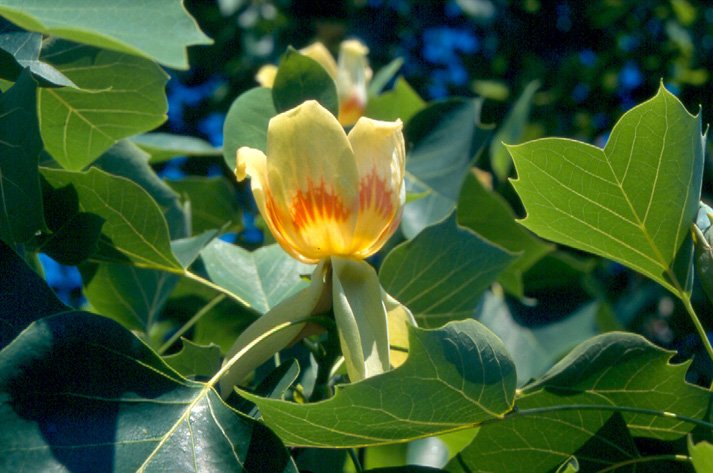
Intensive Course Session 6 of 7 | Plants of the Canopied Landscape: Woodlands, Edges, & Hedgerows (Summer 2025)
Professional Virtual Intensive Course
Instructor: Ian Caton
In this session, native plant authority Ian Caton will examine plants of the canopied landscape that exemplify the ecological characteristics described by Larry Weaner in previous sessions. His presentation will include plants found at all of the woodland’s vertical layers, from canopy to understory. He will also discuss their specific abilities to integrate with the unique colonization strategies inherent in woodland development and enhancement. Finally, Ian will present a group of “workhorse” native species for the woodland, including those that combine reliability with desirable aesthetic characteristics.
Registration is open and the recording is viewable for 3 months after the live session date.

Intensive Course Session 7 of 7: The Artistic Overlay: Making “Wild” Legible (Summer 2025)
Professional Virtual Intensive Course
Instructor: Larry Weaner, FAPLD
Ecological design need not be a bitter aesthetic pill that our clients must swallow to do the right thing. The order inherent in our wild native landscapes is widely considered beautiful. By translating that ecology-based order into the aesthetically-based language of fine garden design, the results can be much more universally embraced by our clients. In addition, Larry will illustrate how highly gardenesque - and even formal - elements can gracefully interact and intermingle with wilder woodland, shrubland, and meadow compositions. This approach can result in landscapes that are both ecologically productive and visually pleasing to clients with a variety of aesthetic preferences.
Registration is open and the recording is viewable for 3 months after the live session date.

Ecology-based Design and Organic Practice at Glenstone Museum, Potomac, MD | In-person
The landscape at Glenstone, a newly-constructed, contemporary art museum in Potomac, Maryland, received the ASLA Honor Award in 2019. The property contains 90 acres of planted meadows, shrub thickets, and woodland glades that stretch from the property borders to the museum buildings. This organically planted and maintained landscape illustrates how landscape architects (Peter Walker Partners), native plant consultants (Larry Weaner Landscape Associates), and an in-house management team can collaborate in the service of ecology, art, and a stimulating visitor experience. Our day will combine classroom instruction with a heavy dose of field observation to illustrate how this landscape went from landscape plans to vibrant reality.
Category: Professional (CEUs available)
Fee: $310
Student rate (with ID): $246

Native Perennials: Flower Border or Functional Ground Layer (Spring Virtual Series)
Larry Weaner, FAPLD
Perennials have long been planted for the beauty of their flowers, but in the wild they are a functioning part of virtually every ecological system. Their roots hold soil in place. Their seeds provide food for birds. Their flowers provide crucial nectar for pollinators while their stems and leaves host insect eggs (including declining Monarch butterflies). Finally, when planted as a dense ground layer, they can reduce the most time-consuming aspect of garden maintenance....weeding. In this presentation you will learn how to use seed and live plants to create perennial compositions that enhance the aesthetic, practical, and ecological character of any landscape.
Category: Home Gardener & Professional
Fee: $35
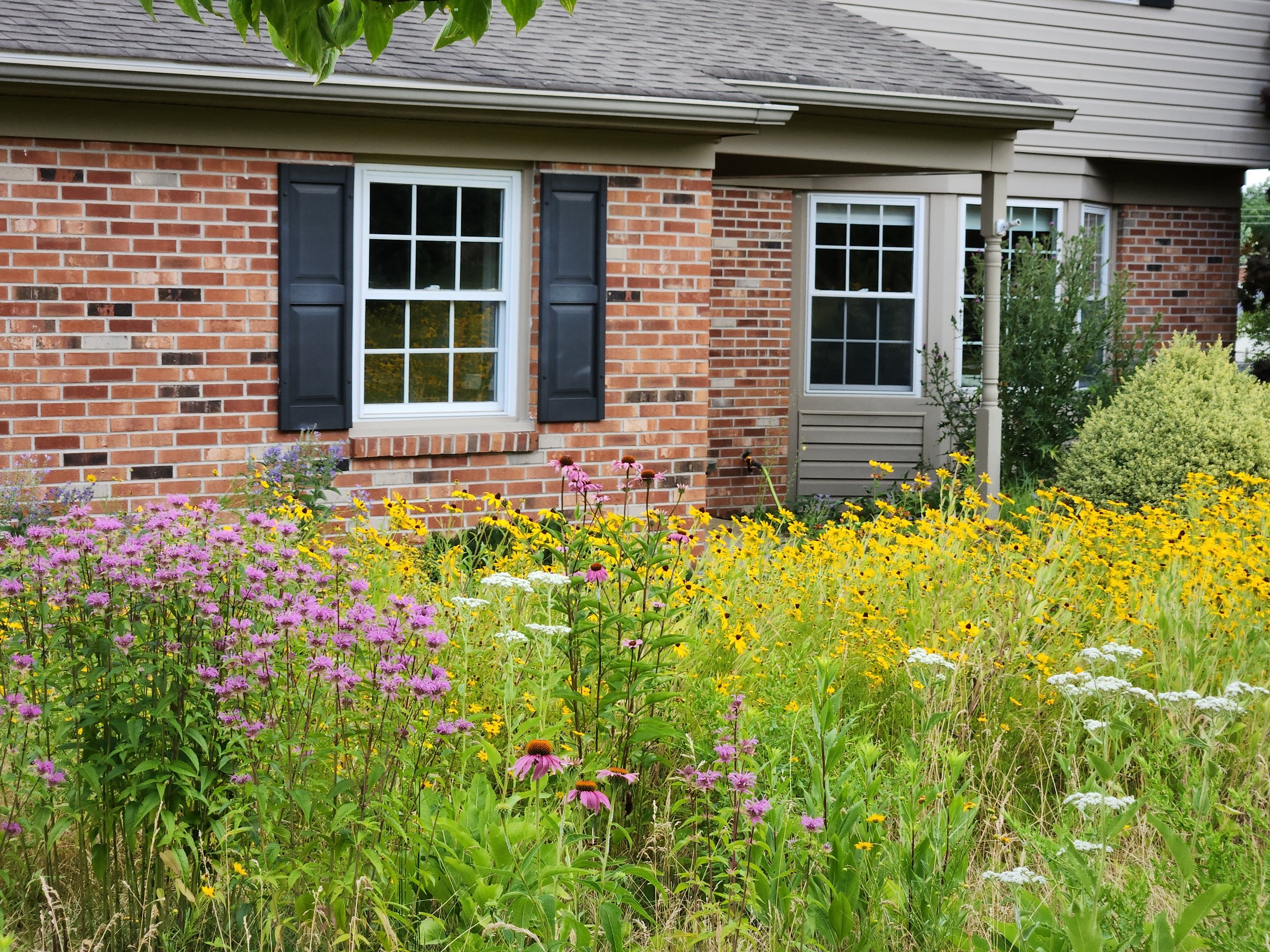
Lawn to Meadow: Transition with a “Light Touch” (Spring Virtual Series)
Larry Weaner, FAPLD and Sara Weaner Cooper
No chemical use, no hauling, no digging, no smothering - no early-stage ugly phase.
Sounds too good to be true.
Yet by gradually applying a series of light touch actions, you can achieve this organic transition without breaking your back, sparking ecological angst, or infuriating your neighbors. These actions can include timed mowing, selective height cutting, pH manipulation, and organic herbicide application.
In this session, Sara will discuss her lawn to meadow conversion (featured in The New York Times, 2024), including 2025 updates and plans, illustrating a homeowner’s perspective. Larry will explore case studies exemplifying the technical underpinnings behind this approach, from a landscape designer's perspective. This brains over brawn approach can transform the experience of creating residential meadows from daunting to uplifting.
Category: Home Gardener & Professional
Fee: $28

Breaking the Grass Ceiling (Part Two): A Historic Cemetery Reckons with its Lawn Legacy (Spring Virtual Series)
Sara Evans and Jenna Webster
Rural cemeteries were among the first public landscapes in America to adopt expansive formal lawns, a legacy with far-reaching ecological, social, and financial consequences. Today, in the face of the climate crisis, The Green-Wood Cemetery in Brooklyn is working to adopt compelling alternatives, from less resource-intensive grass species to testing strategies for low native meadows. Learn the benefits and challenges of these approaches, understand what it takes to steward these dynamic plantings in a cultural landscape, and see how they could have applications beyond cemeteries.
Fee: $42

Breaking the Grass Ceiling (Part 1): Native Lawns and Low Growing Meadows (Spring Virtual Series)
Dave Kaplow
How do we create true native habitat that is compatible with an urban and suburban environment? This lecture focuses on meadow/lawn hybrids, and how they can be used to create natural areas that are also accessible for frequent human use. Dave will emphasize the use of both cool and warm season grasses as the foundational species, as well as the broad leaf perennials that can visually and ecologically complement them. Illustrated applications will range from native lawn on residential properties, to the open areas surrounding business plazas and shopping areas, to the fields and meadows of public parks.
Fee: $42

Prescribed Fire as a Foundational Landscape Tool: From Campus to Residence (Spring Virtual Series)
Native Grasslands Restoration: Is Fire Needed?
Bert Harris, Ph.D.
Burning on the Run: Prescribed Burns in the Small Scale Landscape
Fritz Reuter
Fee: $58

Intensive Course Session 7 of 7: The Artistic Overlay: Making “Wild” Legible
Professional Virtual Intensive Course
Instructor: Larry Weaner, FAPLD
Ecological design need not be a bitter aesthetic pill that our clients must swallow to do the right thing. The order inherent in our wild native landscapes is widely considered beautiful. By translating that ecology-based order into the aesthetically-based language of fine garden design, the results can be much more universally embraced by our clients. In addition, Larry will illustrate how highly gardenesque - and even formal - elements can gracefully interact and intermingle with wilder woodland, shrubland, and meadow compositions. This approach can result in landscapes that are both ecologically productive and visually pleasing to clients with a variety of aesthetic preferences.
Registration is open and the recording is viewable for 3 months after the live session date.

Intensive Course Session 6 of 7 | Plants of the Canopied Landscape: Woodlands, Edges, & Hedgerows
Professional Virtual Intensive Course
Instructor: Ian Caton
In this session, native plant authority Ian Caton will examine plants of the canopied landscape that exemplify the ecological characteristics described by Larry Weaner in previous sessions. His presentation will include plants found at all of the woodland’s vertical layers, from canopy to understory. He will also discuss their specific abilities to integrate with the unique colonization strategies inherent in woodland development and enhancement. Finally, Ian will present a group of “workhorse” native species for the woodland, including those that combine reliability with desirable aesthetic characteristics.
Registration is open and the recording is viewable for 3 months after the live session date.

Intensive Course Session 5 of 7 | The Canopied Landscape: Woodlands, Edges, & Hedgerows
Professional Virtual Intensive Course
Instructor: Larry Weaner, FAPLD
An ecology-based approach to woodland design is more like guiding a vegetative process than implementing a static planting plan. Guided succession can foster the orderly transformation from an open field to a multi-tiered forest through planting, managed natural recruitment, or a combination of the two. Under existing canopy, where few herbaceous species can be established through direct seeding, we will discuss the planting of small “seed source colonies,” and management strategies to encourage their proliferation into the larger landscape. Management techniques that are unique to woodlands including selective height cutting, sunlight manipulation, and assisted seed dispersal, will also be described in detail.
Registration is open and the recording is viewable for 3 months after the live session date.

Intensive Course Session 4 of 7 | Plants of the Open Landscape: Meadows, Old Fields, & Shrublands
Professional Virtual Intensive Course
Instructor: Ian Caton
In this session, native plant authority Ian Caton will examine plants of the open landscape that exemplify the ecological characteristics described by Larry Weaner in previous sessions. His presentation will span the successional period from herbaceous meadow, to mixed woody/ herbaceous old field, to the ecologically important but often neglected clonal shrub thicket. He will also present a group of “workhorse” native species for the sunlit landscape that combine reliability and weed suppression with attractive aesthetic character.
Registration is open and the recording is viewable for 3 months after the live session date.

Intensive Course Session 3 of 7 | The Open Landscape: Meadows, Old Fields, & Shrublands
Professional Virtual Intensive Course
Instructor: Larry Weaner, FAPLD
Wildflower meadows and native grasslands are in high demand, but effective protocols for successfully achieving them are in short supply. Here we will delve into the nitty gritty of meadow design: site analysis, species selection, seed mix formulation, live plant inclusion, planting and management. The inclusion of shrub thickets and drifts will also be covered, including the arrangement of clonal vs. clump forming species, and the use of shrublands as ecological and visual “connective tissue” between meadow and woods.
Registration is open and the recording is viewable for 3 months after the live session date.

Intensive Course Session 2 of 7 | Ecology-based Design
Professional Virtual Intensive Course
Instructor: Larry Weaner, FAPLD
*Sessions 1 & 2 recommended prerequisite for all other Sessions
Larry will expand upon the ecological principles described in Session 1 by illustrating them in the context of landscape plans, planting protocols, and management procedures. He will also describe often-neglected plant characteristics that are crucial to ecology-based practice. These will include habitat fidelity, colonization patterns, seasonal growth period, life spans, spatial and temporal niche, and proliferation strategies.
Registration is open and the recording is viewable for 3 months after the live session date.

Intensive Course Session 1 of 7 | Foundational Ecological Principles
Professional Virtual Intensive Course
Instructor: Larry Weaner, FAPLD
*Sessions 1 & 2 recommended prerequisite for all other Sessions
Our opening presentation will examine the species traits, vegetative patterns, and ecological processes found in spontaneous plant communities. The patterns and processes explored will include disturbance, succession, competition, and relative ecological stability. This session will serve as the theoretical basis for the practical design, planting, and management procedures detailed in all subsequent sessions.
Registration is open and the recording is viewable for 3 months after the live session date.
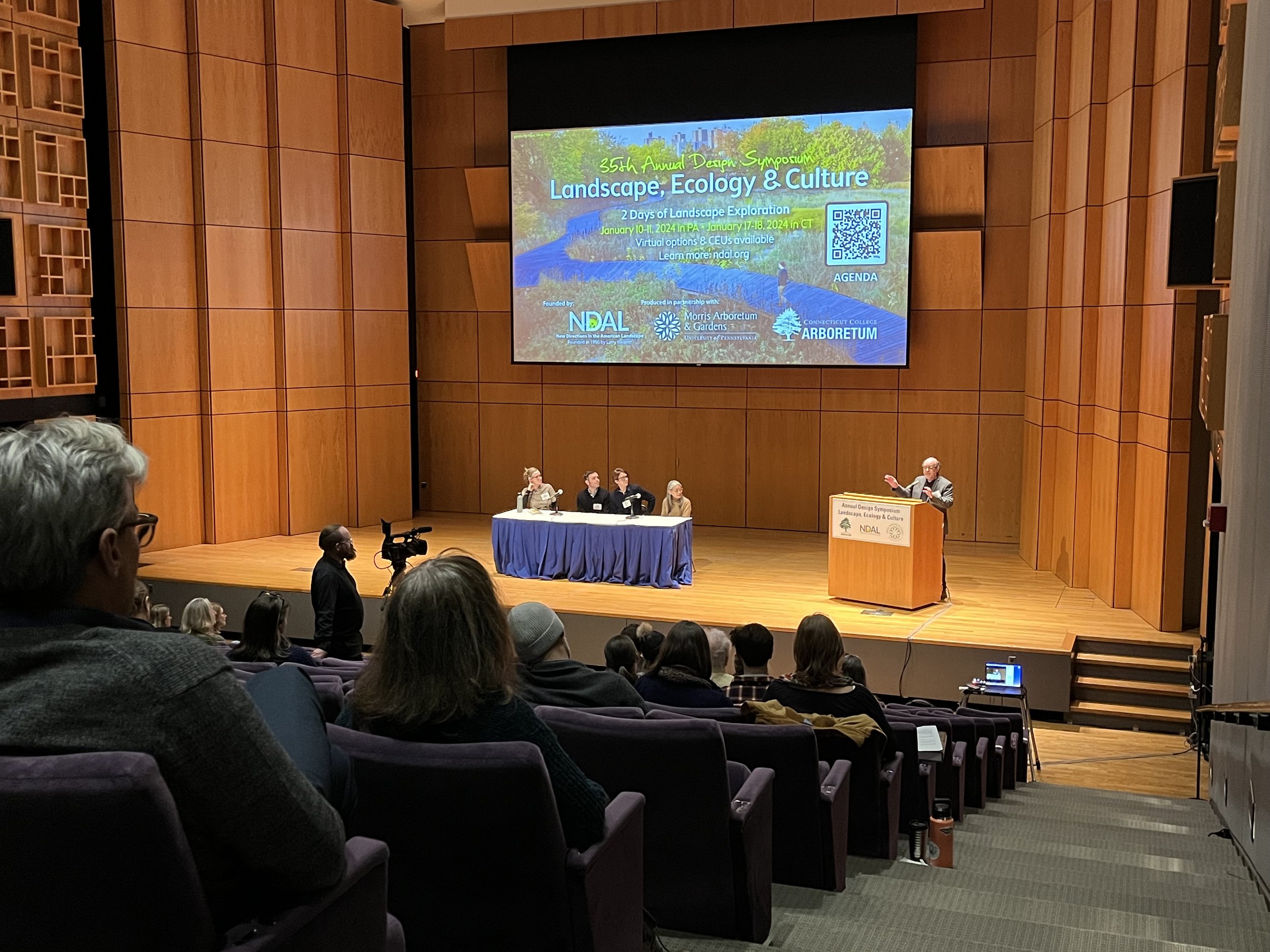
Landscape, Ecology & Culture: 36th Annual Design Symposium | Recordings
Founded in 1990, this annual two-day symposium has a long tradition of celebrating native plants and innovative ecological practice. Presenters reflect the diverse factors that shape our landscapes including landscape architects, landscape designers, horticulturists, ecologists, historians, anthropologists, artists and others. The series offers in-depth explorations of forward-looking and overlooked topics, always seeking to connect theory with practical application. Join us as we continue to connect the dots between ecological restoration, cultural landscape practice, and fine garden design.
Category: Professional
Register to view the recordings!
Registration open and recordings viewable until April 17, 2025

Ecology-based Design and Organic Practice at Glenstone Museum | In-person
The landscape at Glenstone, a newly-constructed, contemporary art museum in Potomac, Maryland, received the ASLA Honor Award in 2019. The property contains 90 acres of planted meadows, shrub thickets, and woodland glades that stretch from the property borders to the museum buildings. This organically planted and maintained landscape illustrates how landscape architects (Peter Walker Partners), native plant consultants (Larry Weaner Landscape Associates), and an in-house management team can collaborate in the service of ecology, art, and a stimulating visitor experience. Our day will combine classroom instruction with a heavy dose of field observation to illustrate how this landscape went from landscape plans to vibrant reality.
Registration is now closed for this event.
